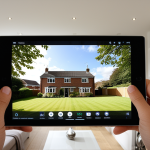Overview of Recent Trends in UK Healthcare Innovations
Recent UK healthcare innovation trends highlight a dynamic shift towards integrating advanced technologies within the NHS framework. Central to this evolution are NHS technology initiatives, which actively promote digital transformations aimed at enhancing healthcare delivery and patient outcomes.
Among the most significant developments is the widespread adoption of electronic health records, which improve data sharing and clinical decision-making. Additionally, NHS-led programs are increasingly embracing mobile health apps, offering patients convenient access to health monitoring and communication tools. These innovations collectively streamline workflows, reduce administrative burdens, and provide more personalized care pathways.
Have you seen this : How Does the UK Prioritize Mental Health Promotion in Communities?
Furthermore, current developments emphasize the use of automation and artificial intelligence to optimize diagnostics and predictive analytics. The NHS is fostering pilot projects that demonstrate promising results, although scaling these technologies remains an ongoing challenge.
Importantly, innovation is reshaping patient experiences by enhancing access through telemedicine and remote monitoring, while also supporting precision healthcare initiatives like genomics. This integrated approach underscores the NHS’s commitment to leveraging technology for both immediate clinical benefits and long-term system transformation.
Topic to read : What Health Initiatives Are Changing Lives in the UK?
Overview of Recent Trends in UK Healthcare Innovations
Recent UK healthcare innovation trends are reshaping patient care, driven significantly by the National Health Service’s (NHS) focused technology initiatives. The NHS technology landscape is rapidly evolving with breakthroughs in digital tools, precision medicine, and automation. Current developments emphasize improving healthcare delivery and outcomes through enhanced data sharing, patient engagement, and more effective clinical decision-making.
Crucial to this progress are NHS programs fostering integration of electronic health records and mobile solutions, enabling smoother communication between patients and providers. These efforts align with a broader push to optimize workflows and reduce administrative burdens.
Innovations like AI-assisted diagnostics and remote monitoring devices illustrate how technology is revolutionizing healthcare. They not only increase efficiency but also empower personalized care models—fundamental shifts in how treatment plans are formulated and adjusted. This wave of transformation equips clinicians with deeper insights and patients with better access to tailored services.
Together, these strides reflect a dynamic period in UK healthcare, where strategic NHS policies and emerging technologies converge to enhance clinical outcomes and patient experience.
Digital Health Transformation in the UK
Digital health UK is rapidly evolving, with electronic health records (EHRs) at the forefront. EHR adoption has improved clinical coordination by enabling seamless data exchange across NHS systems. Patient portals complement this by granting individuals direct access to their health information, fostering engagement and self-management.
Mobile health apps are also gaining traction among UK patients and clinicians. These tools support symptom tracking, medication adherence, and appointment scheduling, making healthcare more accessible and convenient. The rising usage patterns reflect growing trust and acceptance of digital health solutions within everyday care.
Numerous hospital trusts and clinics have implemented these technologies successfully. For instance, some NHS trusts integrate EHRs with mobile apps to enhance real-time communication between patients and care teams. Such implementations reduce waiting times and improve diagnostic accuracy.
Overall, digital health UK initiatives demonstrate that combining EHRs and mobile health apps enhances patient outcomes and streamlines NHS workflows. This integration marks a pivotal step in the ongoing transformation of healthcare delivery driven by innovation.
Digital Health Transformation in the UK
Digital health UK has rapidly evolved, largely through the widespread adoption of electronic health records (EHRs) and patient portals. These tools enhance data accessibility, enabling clinicians and patients to access medical histories securely and efficiently. EHRs streamline communication within the NHS, reducing errors and improving care coordination. Mobile health apps also play a significant role, with growing usage among UK patients and healthcare professionals for monitoring chronic conditions, medication adherence, and appointment management.
Hospitals and clinics are increasingly integrating these digital solutions, transforming traditional care delivery. For example, several NHS Trusts have successfully implemented EHR systems that allow seamless data sharing across departments, improving diagnostic accuracy and treatment planning. Mobile health apps complement these efforts by providing real-time health data, fostering patient engagement, and supporting preventative care.
Together, electronic health records and mobile health apps demonstrate how digital health UK innovations are reshaping patient interaction, clinical workflows, and overall NHS service efficiency. Continued investment in these technologies promises to further enhance healthcare outcomes and accessibility across the UK.
Artificial Intelligence and Automation in Clinical Practice
Artificial intelligence (AI) in UK healthcare is rapidly advancing, with clinical automation and machine learning NHS initiatives at the forefront. AI applications include diagnostic support, where algorithms analyze imaging or pathology data to improve accuracy and speed. Additionally, administrative automation reduces clinician workloads by handling scheduling, billing, and coding tasks, allowing staff to focus more on patient care.
Predictive analytics powered by AI enable early identification of patient risks, helping prevent hospital admissions and enabling proactive interventions. Pilot projects across NHS trusts demonstrate promising clinical and operational outcomes, validating these technologies’ impact.
However, scaling AI within the NHS faces challenges including data privacy, integration with legacy systems, and ensuring equity in algorithm training. Opportunities lie in expanding AI tools to underserved areas and standardizing evaluation frameworks to measure effectiveness and safety.
By addressing these challenges, AI in UK healthcare can continue transforming clinical workflows and enhancing patient outcomes. The collaboration between technology developers, clinicians, and NHS policymakers is crucial for sustainable AI integration into everyday practice.
Artificial Intelligence and Automation in Clinical Practice
AI in UK healthcare is advancing rapidly, transforming diagnostics, clinical workflows, and data analytics. A primary use case involves AI-assisted diagnostics, where machine learning NHS applications analyze medical images and patient data to detect conditions earlier and with greater accuracy. This enhances clinical decision-making and reduces diagnostic errors.
Clinical automation is streamlining administrative tasks such as appointment scheduling and record management, allowing clinicians to focus more on patient care. Predictive analytics powered by AI help foretell patient risks and optimize treatment pathways, contributing to more proactive healthcare delivery.
Several pilot projects across NHS trusts have evaluated AI effectiveness, demonstrating improved efficiency and patient outcomes. However, scaling AI remains challenging due to integration complexities, data privacy concerns, and the need for clinician training.
Opportunities lie in expanding AI tools alongside ongoing NHS technology initiatives, addressing these barriers through robust governance and iterative implementation. By carefully navigating these hurdles, AI and clinical automation promise to significantly amplify the impact of UK healthcare innovation trends, fostering a more responsive and efficient system.
Overview of Recent Trends in UK Healthcare Innovations
Recent UK healthcare innovation trends reveal a strong emphasis on integrating sophisticated digital tools within NHS infrastructure. Central to these efforts, NHS technology initiatives drive transformative changes aimed at improving both the efficiency of healthcare delivery and patient outcomes.
Key current developments include the expansion of digital records, AI-powered clinical support, and enhanced telehealth services. NHS programs actively encourage the adoption of interoperable systems that streamline data sharing and reduce administrative tasks, enabling clinicians to devote more time to patient care. Innovations in diagnostics, predictive analytics, and administrative automation are being tested through various pilot projects, showing promising results in accuracy and operational efficiency.
These innovations are shifting healthcare from reactive to proactive models, allowing for earlier interventions and personalized treatment plans. NHS-led collaboration with technology developers ensures that these advancements align with clinical needs and patient expectations. Collectively, the UK healthcare innovation trends underscore a significant leap forward in modernizing healthcare delivery while maintaining a patient-centred approach.
Overview of Recent Trends in UK Healthcare Innovations
Recent UK healthcare innovation trends are largely driven by comprehensive NHS technology strategies aimed at modernizing care delivery. Central to current developments is the NHS’s emphasis on fostering seamless integration of digital tools within clinical practices. These include advanced data-sharing platforms, expanding use of mobile health applications, and introducing AI for clinical decision support.
The NHS actively promotes innovation through pilot programs and funding initiatives, enabling rapid testing and refinement of new technologies. This targeted support accelerates adoption while addressing practical challenges such as interoperability and staff training.
Collectively, these innovations are reshaping healthcare delivery by enabling faster, more accurate diagnoses, reducing administrative burdens, and enhancing patient engagement. For example, initiatives combining electronic health records with AI algorithms allow real-time data analysis, supporting more personalized and timely treatments.
Such advancements improve overall patient outcomes and system efficiency. The continuous evolution of NHS technology efforts ensures that innovation remains aligned with clinical needs and healthcare policy goals, paving the way for a more responsive and sustainable UK healthcare system.
Advances in Telemedicine and Remote Patient Monitoring
The rise of telemedicine UK has significantly transformed healthcare delivery, especially following the pandemic’s acceleration of virtual care adoption. Through video and phone consultations, NHS technology now offers patients easier access to clinicians without the need for physical visits. This shift reduces appointment waiting times and expands reach across remote or underserved areas.
Coupled with telemedicine, remote patient monitoring tools track health metrics such as blood pressure, glucose levels, or heart rate in real time. These devices send data directly to healthcare providers, enabling timely interventions for chronic conditions and acute issues. NHS initiatives promote these technologies to improve both patient outcomes and system efficiency.
Virtual consultations also enhance communication pathways, creating more flexible, patient-centred care models. However, challenges remain in ensuring technology access equity and integrating remote data within existing NHS workflows. Continued investment in training and infrastructure is critical to maximize the potential of telemedicine UK and remote monitoring.
Overall, these current developments illustrate how virtual healthcare and monitoring technologies innovate the NHS experience, offering convenience while improving clinical oversight and reducing strain on traditional services.










